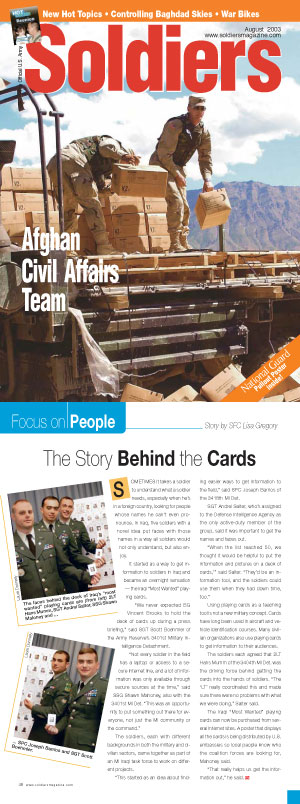
Sometimes it takes a soldier to understand what a soldier needs, especially when he’s in a foreign country, looking for people whose names he can’t even pronounce. In Iraq, five soldiers with a novel idea put faces with those names in a way all soldiers would not only understand, but also enjoy.
It started as a way to get information to soldiers in Iraq and became an overnight sensation — the Iraqi “Most Wanted” playing cards.
“We never expected BG Vincent Brooks to hold the deck of cards up during a press briefing,” said SGT Scott Boehmler of the Army Reserve’s 3401st Military Intelligence Detachment.
“Not every soldier in the field has a laptop or access to a secure Internet line, and a lot of information was only available through secure sources at the time,” said SSG Shawn Mahoney, also with the 3401st MI Det. “This was an opportunity to put something out there for everyone, not just the MI community or the command.”
The soldiers, each with different backgrounds in both the military and civilian sectors, came together as part of an MI Iraqi task force to work on different projects.
“This started as an idea about finding easier ways to get information to the field,” said SPC Joseph Barrios of the 3418th MI Det.
SGT Andrei Salter, who’s assigned to the Defense Intelligence Agency as the only active-duty member of the group, said it was important to get the names and faces out.
“When the list reached 50, we thought it would be helpful to put the information and pictures on a deck of cards,'” said Salter. “They’d be an information tool, and the soldiers could use them when they had down time, too.”
Using playing cards as a teaching tool is not a new military concept. Cards have long been used in aircraft and vehicle identification courses. Many civilian organizations also use playing cards to get information to their audiences.
The soldiers each agreed that 2LT Hans Mumm of the 3404th MI Det. was the driving force behind getting the cards into the hands of soldiers. “The ‘LT’ really coordinated this and made sure there were no problems with what we were doing,” Salter said.
The Iraqi “Most Wanted” playing cards can now be purchased from several Internet sites. A poster that displays all the cards is being distributed by U.S. embassies so local people know who the coalition forces are looking for, Mahoney said.
“That really helps us get the information out,” he said.
Story by SFC Lisa Gregory
Soldiers Magazine
August 2003